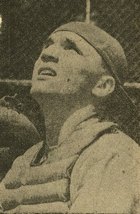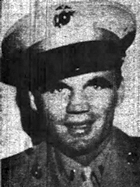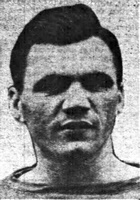Jim Robertson
| Date and Place of Birth: | August 31, 1919 Albany, OR |
| Date and Place of Death: | April 20, 1944 off Green Island, Pacific Ocean |
| Baseball Experience: | Minor League |
| Position: | Catcher |
| Rank: | First Lieutenant |
| Military Unit: | VMB-413 U.S. Marine Corps |
| Area Served: | Pacific Theater of Operations |
James G. Robertson, the son of Robert and Lola Robertson, was born on
August 31, 1919, in Albany, Oregon about 30 miles south of Salem. He
attended Albany High School where, as a catcher, he led the Bulldogs to
three consecutive championships and was named to the county all-star
team each year. In his senior year the Bulldogs lost to Eugene in the
district finals and won the Strawberry Fair championship. He also played
football and was an all-star basketball player; a league high scorer his
senior year and recipient of the school’s outstanding all-around athlete
award.
Beginning in 1938, Robertson continued his high profile athletic
pursuits at Willamette University in Salem. Under the guidance of coach
Roy “Spec” Keene (Oregon Sports Hall of Fame inductee 1982), Robertson
was the Bearcats’ starting catcher for four years. In 1940 he caught
every inning of the team’s 22 games as they clinched the Northwest
Conference championship for the first time since 1931. Among his
teammates at Willamette were pitchers Bill Hanauska and Earl Toolson,
and infielders Clint Cameron and Lee Shinn, who all went on to play
minor league ball. During the summer of 1940, he played semi-pro
baseball with the Albany Alcos and injured his leg while sliding,
resulting in him missing part of the season and also being unable to
play basketball at Willamette the following winter.
Robertson finished his collegiate catching days in the spring of 1941
and played summer ball for the Silverton Red Sox of the Oregon State
League – the same team Boston Red Sox infielder Johnny Pesky had played
for two years earlier (many of the Silverton Red Sox players worked for
the Silver Falls Timber Company which was owned by Boston Red Sox owner
Tom Yawkey). The Red Sox were state semi-pro champions that year and
clinched the league title in September with a 14-5 win over Medford. The
Silverton line-up of 1941 featured Willamette teammates Toolson and
Shinn, future PCL outfielder Bill Carney and big leaguer Dick Whitman.
Robertson completed his basketball competition at Willamette in the
winter – where he was named to the Northwest Conference all-star team -
and signed with the Salem Senators of the Class B Western International
League in February 1942. One of his first games for the Senators was
against his alma mater on April 23 at George E. Waters Park – home of
both the Senators and Bearcats. In a close fought contest it was
Robertson’s infield dribbler that scored the only run of the game in the
bottom of the ninth.
Playing for first year manager Charlie Petersen, Robertson held his own
behind the plate and with the bat for the Senators. He had a three hit
game against the Spokane Indians in May and was batting .250 in 21 games
when military service beckoned in June.
Jim Robertson initially served with the U.S. Navy but transferred to the
Marine Corps after completing pre-flight training at St. Mary's,
California, NAS Pasco, Washington and NAS Corpus Christi, Texas. After
earning his wings, he returned home in mid-December 1943, for a brief
furlough. "I'm on the first team now," he told the Salem
Statesman-Journal, "and our outfit is packed and ready to ship out. I'm
in with a great bunch - 76 flying officers and over 300 crewmen on the
team. Somebody's in for a lot of headaches."
Robertson was part of VMB-413 – the Marine Corps’ first
medium bomber squadron. With 1st Lieutenant Jim Robertson as pilot and
squadron athletic officer, VMB-413 deployed to Hawaii in January 1944.
The squadron flew North American PBJ-1s; the U.S. Navy’s equivalent of
the famous B-25 twin-engine Mitchell bomber, and the flight echelon flew
to the island of Espiritu Santo, part of the New Hebrides, at the end of
the month. Following a brief training period, the squadron then moved
northward to Stirling Island (part of the Treasury Islands) from where
it flew night-time missions against Japanese forces at Rabaul and
neighboring islands.
Shortly before midnight on April 20, 1944, Robertson, with the
squadron’s executive officer Major Douglas E. Keeler at the controls of
the PBJ-1D, was returning from a mission over the Japanese stronghold of
Kavieng on the island of New Ireland. The bomber had been damaged by
Japanese anti-aircraft fire and was attempting a landing in heavy rain
at the Allied airstrip on Green Island when it overshot the runway and
crashed into the lagoon killing all on board. In addition to Jim
Robertson and Major Keeler, other crew members were Second Lieutenant
Charles F. Leidberg from Chicago; Staff Sergeant Gilbert V. Enck of
Portland, Oregon; Sergeant Aaron S. Johnson Jr. of Pluckemin, New
Jersey; and Sergeant Robert C. Hubbell of Philadelphia.
“'Robbie,' as he was affectionately known by friends and athletic foes
alike, was . . . one of Willamette’s best baseball players,” recalled
the Willamette Collegian newspaper upon news of his tragic death.
Jim Robertson, who was about to receive a captain's commission, was
survived by his wife and a one month old daughter named Dotty Ann, whom
he had never seen. He is buried at Willamette Memorial Park in Albany,
Oregon.
|
Team |
League |
Class |
G |
AB |
R |
H |
2B |
3B |
HR |
RBI |
AVG |
|
| 1942 | Salem | Western Int'l | B | 21 | 64 | 8 | 16 | 1 | 0 | 0 | 6 | .250 |
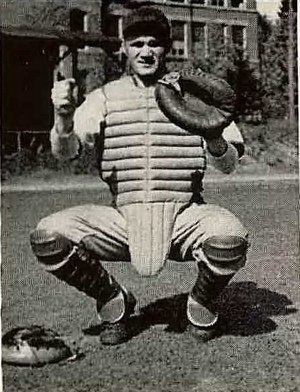
Robertson at Willamette in 1939
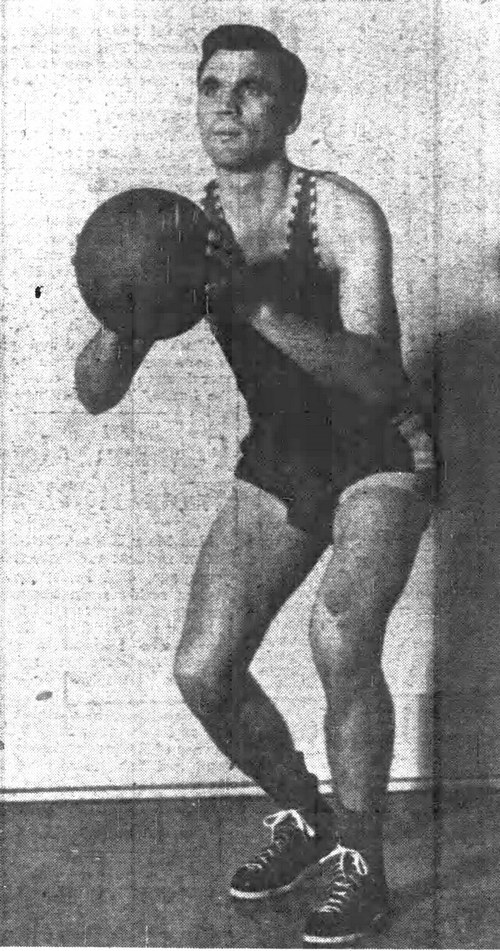
Jim Robertson at Willamette University in 1942
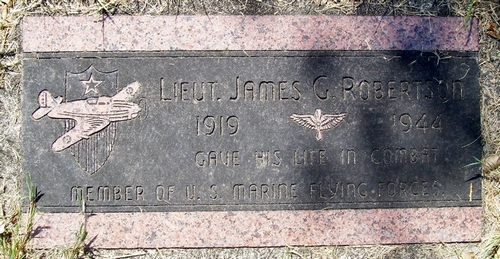
Jim Robertson's grave at Willamette Memorial Park in Albany, Oregon
Thank you to Rose Marie Walter, Archivist at Willamette University and Diane Moody, Reference Librarian at Albany Public Library, Oregon, for help with this article. Information was also obtained from the VMB-413 website at www.vmb413.com. Thanks also to Astrid van Erp for help with photos and information for this biography.
Date Added February 12, 2012 Updated August 2, 2017
Baseball's Greatest Sacrifice is associated with Baseball Almanac
Baseball's Greatest Sacrifice is proud to be sponsored by

